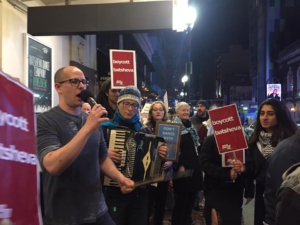
On April 6, about 40 human rights advocates formed a picket line outside of the Shubert Theater in Downtown Boston to protest a performance by the Batsheva Dance Company, which is based in Israel. Drawing inspiration from the labor movement, the protesters implored event ticket holders to refrain from crossing the picket line. A series of similar demonstrations against Batsheva’s North American tour have been been held in Seattle, Colorado and New York City.
The protest, entitled “Don’t Dance With Apartheid,” was organized by Massachusetts Against Hewlett-Packard, which supports the international Boycott, Divestment and Sanctions movement. The BDS movement seeks to hold Israel accountable for its occupation of Palestine and other violations of international law. Tala Berro, an organizer with MAHP, explained the significance of boycotting a seemingly benign cultural event, “The Batsheva Dance Company is funded by the Israeli government, and they are a brand ambassador for Israel. That means they tour the world in order to promote an image of Israel as really progressive, really into the arts and really LGBTQ friendly. In reality, this is all done in order to mask their ethnic cleansing and occupation of Palestine. This all part of a larger ‘Brand Israel’ campaign that was started by the Israeli government in 2006.”
As the picket line circled the entrance to the Shubert Theater, some demonstrators distributed informational pamphlets to passersby and attendees of the dance performance. The picketers engaged in their own cultural performance; singing and chanting slogans such as “While we dance to liberate, Batsheva dances for a racist state!” Between the chants, several speakers addressed the crowd. “I’m up for dancing as much as anybody else, I love music,” one organizer said, “but there’s no dance in the world, and there’s no flag big enough to clean the blood of colonized people. To wash away the pain of the millions of Palestinians who are living under brutal martial law. Who are living in exile around the world. More than seven million people forced away from their homes. Forced to never be able to return under this racist apartheid regime.”
A number of speakers identified the close collaboration between the U.S. and Israeli governments to explain the need for U.S. residents to participate in the BDS movement. Speakers drew particular attention to the over $3 billion of aid that the U.S. provides Israel each year.
Towards the end of the demonstration, MAHP organizer William Ruhm triumphantly announced that because of the picket line, at least two people with multiple tickets to Batsheva’s performance decided not to attend. Ruhm explained the value in using BDS protests as educational opportunities. “[Israel] is a state that is saying because of who you are, because of your racial, religious and/or ethnic identity, you have less ability to move freely, access water, be reunified with your family and your children. When people are able to get their heads around those facts, it resonates. There’s a moral argument that can sway a lot of people. We want to talk to those people.”






